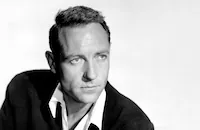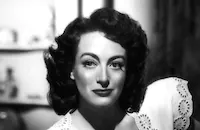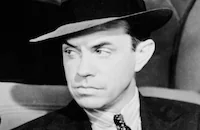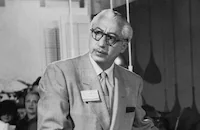Torch Song

Brief Synopsis
Cast & Crew
Charles Walters
Joan Crawford
Michael Wilding
Gig Young
Marjorie Rambeau
Henry Morgan
Film Details
Technical Specs

Synopsis
At a rehearsal for her new show, temperamental Broadway star Jenny Stewart lashes out at anyone who displeases her, from her dance partner to her arranger, Charlie Maylor, who has been driven to drink by her bullying. After abruptly walking out of the rehearsal, Jenny goes home and practices a scene with her sympathetic secretary, Anne, then gets into bed and tearfully gives in to feelings of loneliness. The following day, Jenny's boyfriend, playboy Cliff Willard, comes by as she is redesigning her costumes for the show, and she insists that her love for her audience justifies her domineering ways. When Jenny eventually shows up for rehearsal, she is surprised to discover that Charlie has quit and has been replaced by the distinguished Tye Graham, a blind pianist. Tye proves more than adept at accompanying Jenny and accommodating her changes, although she rudely disregards his suggestions. After Tye tries to change the tempo on one of her songs, Jenny orders director Joe Denner to fire him. When everyone has left the theater, however, Jenny secretly tries the song Tye's way. Jenny then goes to a restaurant, where she encounters Tye. The pianist buys her lunch and suggests that she uses her tough demeanor to conceal her fear of being vulnerable. After lunch, Tye returns to his elegant apartment and tells his house man, Peter, that he paid for his friend Charlie to travel to Cuba so that he could get his job. That evening, Jenny goes to Tye's apartment, where he is rehearsing with his jazz quintet, and insists that he come back to work for her. After Jenny leaves, Tye admits to fellow musician Martha, who is in love with him, that despite her fine qualities he will never be able to "see" her as he does Jenny. Tye returns to rehearsals, and Jenny comes to value his opinion. One Sunday morning, as the bored Jenny mopes around her apartment, she tries unsuccessfully to perform simple tasks with her eyes closed, and is struck by the grace and dignity with which Tye lives. In a rush of feeling, she goes to visit her mother, but Mrs. Stewart just nags her for money. Jenny decides to throw a party that night, and instructs her agent, Monty Rolfe, to round up guests and arrange for Tye to entertain. Tye is unavailable, however, which puts Jenny in a sour mood, and she abruptly sends her guests home. Later, after the final dress rehearsal, Jenny is enraged to learn that Tye will not be accompanying the cast to Philadelphia for out-of-town tryouts. She summons Tye to her home later that evening, and he tells Jenny that he used to be a drama and music critic before losing his sight in the war. When he still refuses to go to Philadelphia, they quarrel, and Tye warns Jenny that she is on the road to a terrible decline and lonely end. Jenny goes to see her mother and reluctantly admits her frustration over Tye. Mrs. Stewart produces the scrapbooks she has filled with newspaper clippings about Jenny's career, and Jenny finds a review written by Tye the evening before he went into the service. At her mother's request, Jenny puts on a recording she once made of the song "Tenderly," which Tye had seen her perform. Jenny then goes to Tye's apartment and slips in unnoticed as he is playing "Tenderly" for Martha. After sending Martha away, Jenny surprises Tye with her presence and says she knows how he arranged to get Charlie's job. She adds that she read the old review and knows that he loves her. Tye lashes out in a rage, but Jenny declares her feelings for him. Acknowledging their need for each other, Tye and Jenny kiss.

Director

Charles Walters
Cast

Joan Crawford

Michael Wilding

Gig Young

Marjorie Rambeau

Henry Morgan

Dorothy Patrick

James Todd
Eugene Loring

Paul Guilfoyle

Benny Rubin
Peter Chong
Maidie Norman

Nancy Gates
Chris Warfield
Rudy Render

Charles Walters
John Rosser
Frank Mazzola
Norma Jean Salina
Donna Jean Stewart
Peggy King
Gary Stewart
Mitchell Lewis
Mimi Gibson
Adolph Deutsch
Reginald Simpson

Bess Flowers
Steve Carruthers
Mary Benoit
Estelle Etterre
Paul Power
Dick Winslow
Crew
India Adams
Albert Akst
Preston Ames
Henry Berman
Adolph Deutsch
Adolph Deutsch
Howard Dietz
Alvord Eiseman
Sydney Franklin Jr.
Cedric Gibbons
Kermit Goell
Walter Gross
Sydney Guilaroff
John Michael Hayes
Henri Jaffa
Al Jennings
Jack Lawrence
William B. Lee
Jan Lustig
Jay Marchant
Jack D. Moore
Warren Newcombe
Robert Planck
Richard Rodgers
Helen Rose
Charles Schnee
Arthur Schwartz
Douglas Shearer
Fred Spielman
William Tuttle
Charles Walters
Edwin B. Willis
I. A. R. Wylie

Photo Collections
Videos
Movie Clip




Trailer
Film Details
Technical Specs

Award Nominations
Best Supporting Actress
Articles
Torch Song
Tagline for Torch Song.
"Crawford's back and Metro's got her" should have been the tagline for this semi-musical, which marked the star's return after ten years to the studio where she had started her career. But that was ancient history in 1953 Hollywood, a city with little sense of its own rich past. In fact, the original tagline for Torch Song isn't even accurate, as Crawford had appeared in Technicolor in portions of the studio's earlier Hollywood Review of 1929 and The Ice Follies of 1939. But whatever the ads said, Crawford's return to MGM, a few years after her former boss and sometime nemesis Louis B. Mayer had fallen from power, was news indeed.
The vehicle for her return was an adaptation of I.A.R. Wylie's 1949 Saturday Evening Post story "Why Should I Cry?" about a temperamental but lonely Broadway star who finds true love in the arms of a blind pianist. The story had originally been planned as part of the 1953 omnibus film The Story of Three Loves, with Lana Turner and Ann Sheridan touted to star at different times. Instead, possibly in response to the box-office success of the Broadway-set All About Eve (1950), it became a separate feature, and MGM executive Benny Thau, remembering that Crawford had started out as a dancer, thought it would be the perfect vehicle to bring the studio's one-time star home.
Crawford was thrilled and more than a little frightened to be dancing on-screen again, but the thought of a two-picture deal and the chance to sing on camera for the first time in decades had her riding high. She would brag to one reporter, "You may not know this, but many years ago in this same studio, I made some recordings. They were never released because my boss, L.B. Mayer, thought I was a threat to Jeanette MacDonald. Well, dear Jeanette is gone now, and so is Mister Mayer, and audiences will finally get to hear me sing, and I don't mind saying I am very happy about that." In this she would be disappointed. In an effort to keep costs down, executives decided to use unused tracks recorded for other films, building the score around a big production number based on the Arthur Schwartz-Howard Dietz song "Two-Faced Woman," which had been cut from the same year's The Band Wagon (1953). As a result, Crawford's singing was supplied by India Adams, who had dubbed Cyd Charisse in the earlier film. The only singing Crawford did on her own was a scene where she plays a recording of "Tenderly" and sings along with it for a few bars.
In preparation for her role in Torch Song, Crawford got a face-lift and had some work done on her breasts. She even wore a torpedo bra for the role and had her hair died bright red, to take advantage of the Technicolor photography. Unfortunately, this hardening of her look, coupled with the script's "tough broad" dialogue, has made the film a particular favorite among comics and drag queens, who credit it as the source of Crawford's latter-day image as a "mannish gorgon."
Crawford's return to MGM was a source of mixed emotions for the star. Because Lana Turner, Ava Gardner and Kathryn Grayson weren't working at the time, their dressing rooms were combined into a grandiose suite for Crawford, who was notorious for living at the studio while making a film. The day she arrived, a large banner reading "WELCOME BACK, JOAN" hung over the studio's front gate, and a red carpet had been laid from her parking space to the dressing room door. On the first day of shooting, Crawford presented the crew, many of them old friends, with gifts, a ceremony she usually reserved for the last day. But this was very much a new MGM to Crawford. When she toured the lot and met the current crop of young stars -- including Debbie Reynolds, Bobby Van and Anne Francis, she quipped "Lovely children, but where are the stars." She was particularly dismissive of leading man Michael Wilding's wife, Elizabeth Taylor, referring to her as "Princess Brat." When the younger, more publicity worthy actress insisted on visiting her husband during shooting, Crawford finally left orders that she be barred from the set.
Between husbands at the time, Crawford appears to have had designs on some of her co-workers. She had insisted that former choreographer Charles Walters be assigned to direct, and, to ease her qualms about dancing on screen again, he had offered to play her dancing partner in the film's first scene. Before shooting even began, she demanded meetings with him to discuss the role. To one of these, she brought her jewelry, so he could help her decide which pieces to wear on screen. After they were done, she told him, "I think you should see what you have to work with," Crawford opened her coat to reveal her naked body. Whatever work she may have had done on her breasts was lost on her gay director, who managed to stammer out "That's very nice, Joan," before excusing himself.
With Walters out of reach, Crawford then turned her attention to Gig Young, who was finishing out his MGM contract with the role of a wealthy playboy whose love isn't good enough for Crawford's character. During the early days of the shoot, he was a frequent guest in her dressing room for end-of-day cocktails. When they met by chance in Palm Springs, she left her party to spend time with him, but when he refused to return to her cottage, the invitations stopped abruptly. When Young finally saw Torch Song, he discovered that most of his scenes had been cut.
By contrast, Crawford had no interest at all in Michael Wilding. In fact, she rarely spoke to him on the set, simply sending him notes through the director to warn him not to block her face during their love scenes. An assistant eventually explained to Wilding that Crawford never spoke to her leading men, attributing it to her three failed marriages to actors. Wilding also was frustrated that Walters could give him no advice on how to play a blind man, just telling him to "play it by ear." The actor finally decided to focus his eyes on a spot halfway between himself and the camera. Years later, he ran into a nurse who complimented him on his performance, saying she could tell how carefully he had studied the blind.
Crawford's second contracted film with MGM would never materialize, partly because Torch Song had far from spectacular results at the box office. She would not work on the studio lot again until 1967, when she played a guest-star role on the TV series The Man from U.N.C.L.E. Although she had some fine moments in Torch Song -- particularly her scenes with Marjorie Rambeau, who won an Oscar® nomination for playing Crawford's mother, the film fared poorly with its intended audience. It was mercilessly spoofed on an episode of The Carol Burnett Show that Crawford found in poor taste, and for years was a popular selection in worst film festivals. Then it gradually became more and more obscure over the passage of time. Apart from a snippet of "Two-Faced Woman" number, shown side-by-side with the original number filmed for The Band Wagon in That's Entertainment III (1994), the film itself has been unavailable for years because of a copyright dispute with I.A.R. Wylie's heirs. With copyright issues now settled, however, Torch Song is ripe for rediscovery as one of the more ambitious undertakings in Crawford's later career.
Producer: Henry Berman, Sidney Franklin, Jr., Charles Schnee
Director: Charles Walters
Screenplay: John Michael Hayes, Jan Lustig
Based on the story "Why Should I Cry?" by I.A.R. Wylie
Cinematography: Robert H. Planck
Art Direction: Cedric Gibbons, Preston Ames
Music: Adolph Deutsch
Principal Cast: Joan Crawford (Jenny Stewart), Michael Wilding (Tye Graham), Gig Young (Cliff Willard), Marjorie Rambeau (Mrs. Stewart), Harry Morgan (Joe Denner), Dorothy Patrick (Martha), Paul Guilfoyle (Monty Rolfe), Benny Rubin (Charlie Maylor), Maidie Norman (Anne), Charles Walters (Ralph Ellis), Adolph Deutsch (Conductor).
C-90m. Letterboxed. Closed captioning.
by Frank Miller
Sources:
BETTE & JOAN: The Divine Feud by Shaun Considine
Joan Crawford by Bob Thomas

Torch Song
Quotes
Trivia
This film marked Joan Crawford's return to MGM after a ten year absence. She was previously under contract to MGM from 1925-1943.
Notes
The working title of this film was Why Should I Cry? According to 1951 news items in Daily Variety and Hollywood Reporter, the I. A. R. Wylie story "Why Should I Cry?" was originally to be filmed as one of the short sequences in M-G-M's Three Love Stories (see entry above). A June 23, 1952 Hollywood Reporter news item reported that Lana Turner had been cast in the film, and a March 5, 1953 item in Hollywood Reporter's "Rambling Reporter" column announced that Ann Sheridan would star. According to a June 1952 news item in Hollywood Reporter, Fred Wilcox was originally set to direct the picture. A Hollywood Reporter news item and production charts add Lillian Randolph and Dave O'Brien to the cast, but they were not in the released film.
The song "Two-Faced Woman" was originally recorded by singer India Adams for a Cyd Charisse dance number in The Band Wagon, but was cut from that film and added to Torch Song. The 1994 film That's Entertainment! III features a segment in which the omitted footage of Charisse is shown on a split screen with the Joan Crawford production number from Torch Song. Torch Song received an Academy Award nomination for Best Supporting Actress (Marjorie Rambeau) and was Crawford's first color film. The picture also marked her return to M-G-M after seeking release from her contract a decade earlier. Crawford began her career and rose to stardom at M-G-M, and was under contract to the studio from 1925 to 1943, but dissatisfaction with the roles she was being offered prompted her to become a free agent (although some modern sources suggest that the studio was displeased with her recent films and wanted her to leave). According to a December 16, 1953 Hollywood Reporter news item, music publisher Edwin H. Morris & Co. sued Loew's Inc., M-G-M's parent company, for allegedly using the song "Tenderly" in a manner that violated the licensing agreement. The outcome of this suit has not been determined.

Miscellaneous Notes
Released in United States 1953
Marjorie Rambeau received an Oscar nomination as Best Supporting Actress for her work in this film.
Released in United States 1953














